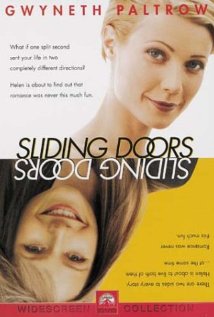“Two Lives to Live”

| None | Light | Moderate | Heavy | |
|---|---|---|---|---|
| Language | ||||
| Violence | ||||
| Sex | ||||
| Nudity |
What You Need To Know:
SLIDING DOORS is a cinematic study of how a single event in our lives can drastically change our future. Containing fantasy elements reminiscent of GROUNDHOG DAY, this movie explores what would happen if a young British woman, named Helen, played by Gwyneth Paltrow, actually caught the train home after a difficult day and what would happen if she missed it. The movie alternates between showing the similarities and differences of Helen’s two different futures based on that single event.
This intriguing parallel of her two lives drastically changed by one single random event is ably pulled off by Paltrow. In one life, she is empowered and successful. In the other, she is stifled and sad. However, all the fornicating and suspense about who is cheating on whom makes SLIDING DOORS more of a soap opera, than the complex life study to which it aspires. Furthermore, Helen’s reaction to her cheating boyfriends makes this almost a feminist, anti-male story. Though containing fantasy, romance and humor set in snazzy London digs, this movie isn’t made for mass audiences and faces some moral and logistical obstacles which may prevent it from reaching those who may be intrigued by the premise of this flawed, but earnest effort at fate and fantasy.
Content:
(Ro, B, LLL, V, SS, AA, D, M) Romantic worldview with moral elements including adultery rebuked; 36 obscenities & 8 profanities; mild violence including implied car accident & woman falls down stairs; briefly depicted fornication & adultery; alcohol use & abuse; smoking; and, lying & cheating
More Detail:
SLIDING DOORS is a cinematic study of how a single event in our lives can drastically change our future. Containing fantasy elements reminiscent of GROUNDHOG DAY and IT’S A WONDERFUL LIFE, this movie explores what would happen if a young British woman, named Helen (Gwyneth Paltrow), just barely caught the subway train traveling home after a difficult day and what would happen if she just missed the train. The movie alternates between these two lives showing the similarities and differences of Helen’s two different futures based on that single event. It is an intriguing, lightweight and melodramatic examination of consequences, determinism and the future people make out of their choices in reaction to their circumstances.
Helen has just lost her job at a very upscale PR firm in London. Frustrated, she decides to take the underground back home to visit her live-in boyfriend, named Gerry (John Lynch), a struggling author. However, a little girl stands in her way, and she just misses the train, as the sliding doors close. Then, the film goes into reverse, taking Helen to the top of the stairs at the train station, and we see the little girl being pulled away by her mother, and Helen making the train. The movie then explores successively what Helen’s futures would be like if she caught or did not catch the train.
The Helen who catches the train meets a young, charming Englishman, named James (John Hannah). This same Helen arrives home in the afternoon, only to catch Gerry in bed with Lydia (a very wicked Jeanne Tripplehorn). Helen breaks up with Gerry, gets a new haircut, accepts a date with James, starts a new PR firm, and promotes a new restaurant opened by a friend of James’.
The Helen who doesn’t catch the train goes outside to catch a taxi and is mugged by a purse snatcher. She arrives home to find Gerry struggling to cover up the evidence of his very recent affair with Lydia. Helen is suspicious, but Gerry takes her out on the town to help her forget her troubles of the day. This Helen gets a job as a delivery girl for a bakery and even makes a delivery to Lydia. This Helen eventually discovers that Gerry and Lydia are having an affair.
Both Helens eventually face tragedy and unexpected pregnancies, but one goes on to find love and happiness, while the other does not. The dialogue is glib and humorous, and the directing is only perfunctory aside from the parallel cutting and interesting editing. Paltrow goes back to her EMMA days and effectively pulls off an English accent. John Hannah and John Lynch are unknown in America and may gain exposure through their roles.
This intriguing parallel of two lives drastically changed by one single seemingly random event is ably pulled off by Paltrow, who might as well be playing twin sisters in this movie. In one life, she is empowered and successful. In the other, she remains stifled and sad. Nevertheless, the events in her life are both strongly influenced by her unprincipled, spineless boyfriend, Gerry. (Gerry’s friend, Russell, tells Gerry that he lives in a “morality-free zone.”) Gerry is a cheater and a liar, and in both lives, he is eventually discovered as a louse. Sadly, we find out that James himself is married, making Helen an adulteress, and James a less admirable character. All this fornicating and suspense about who is cheating on whom tends to make SLIDING DOORS more of a fantastic soap opera, than the richer and more complex life study to which it aspires.
Furthermore, Helen’s reaction to the cheating James and Gerry makes this almost a feminist, anti-male “men-are-pigs” movie. Though containing fantasy, romance, drama, and humor set in snazzy London digs, this movie isn’t made for mass audiences like GROUNDHOD DAY and faces some moral and logistical obstacles which may prevent it from reaching those who may be intrigued by the premise of this flawed but earnest effort at fate and fantasy.


 - Content:
- Content: 




